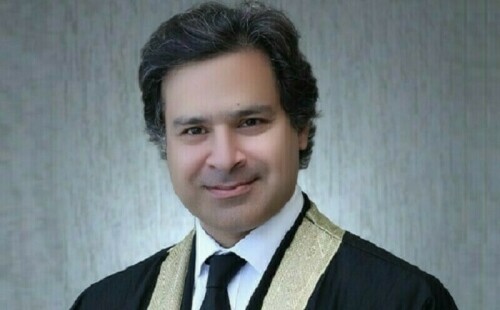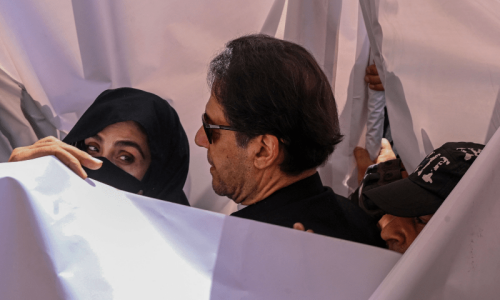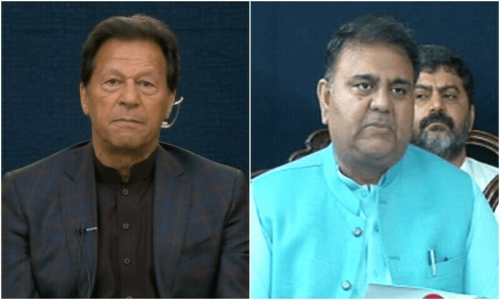The Islamabad High Court (IHC) on Thursday withdrew its stay order on former premier Imran Khan’s in-camera cipher trial after the state counsel assured that the witnesses’ statements would be recorded afresh.
The cipher case pertains to a diplomatic document that the Federal Investigation Agency’s charge sheet alleges was never returned by Imran. The PTI has long held that the document contained a threat from the United States to oust Imran as prime minister.
Last month, Justice Miangul Hasan Aurangzeb had restrained the special court from proceeding against the suspects — including former foreign minister Shah Mahmood Qureshi — till January 11, noting that there were “legal errors” in the case.
The decision had come on Imran’s petition challenging the trial — being conducted at Adiala Jail — and subsequent developments, including the framing of charges and a gag order on the media.
The Special Court (Official Secrets Act) had begun the cipher trial afresh last month at the Adiala district jail after Imran and Qureshi were indicted for a second time in the case on December 13.
The former premier and his aide Qureshi, who is also behind bars, were first indicted in the case in October. Both had pleaded not guilty. The IHC had termed the government’s notification for a jail trial “erroneous” and scrapped the entire proceedings.
Last month, the Supreme Court had approved the post-arrest bails of Imran and Qureshi. While Imran remains incarcerated in other cases, Qureshi’s expected release was also stalled as he was manhandled and re-arrested in a fresh May 9 case.
Today, Justice Aurangzeb presided over the hearing, during which Attorney General for Pakistan Mansoor (AGP) Usman Awan appeared before the judge on court orders.
Salman Akram Raja was present as Imran’s counsel while Sikander Zulqarnain and others also appeared before the court. The FIA sought the services of Justice (rtd) Hamid Ali Shah for assistance in the case.
During the hearing, AGP Awan told the court that the statements of 13 witnesses would be recorded afresh, while the FIA stated that those of 12 others were yet to be recorded.

Following the hearing, Raja said he would also file a petition against Special Court judge Abual Hasnat Mohammad Zulqarnain for “repeatedly making mistakes”.
“The high court has to set aside the proceedings repeatedly,” he told reporters at the IHC.
“The trial would be open but would take place in jail. We will also file a petition on this. Everyone should be allowed to attend the trial and the judge should be changed,” the lawyer said.
The hearing
At the outset of the hearing, Justice Aurangzeb recalled that the court had asked for documents pertaining to the case and inquired AGP Awan why they had not been submitted yet.
To this, AGP Awan said that the case record had arrived and “numbering was taking place”, assuring the court that the documents would be submitted in a while.
He recalled that the trial court had made the proceedings in-camera for a few witnesses, adding that certified copies of their statements were present with the petitioners’ lawyers.
“The order of this division bench was fully implemented upon,” AGP Awan asserted. “If the trial court’s December 14 decision was not right, then we will record the witnesses’ statements again,” he said, referring to barring the coverage of the case proceedings on all mainstream media outlets.
The state counsel urged the court to dispose of the plea against the trial if Imran’s counsel agreed with the recording of testimonies again.
At this point during the hearing, Raja urged the court to set aside the trial court proceedings that took place on December 14 and afterwards, arguing that the state counsel had “admitted” that the December 14 order was not right.
The lawyer argued that the trial court had “made the wrong decision twice”. To this, the judge said, “We all make mistakes. Let’s begin the case from a new point.”
AGP Awan then said that the trial court was ready to begin the proceedings after December 14 afresh.
Justice Aurangzeb also referred to a previous judgment in the Asfanyar Wali case, at which Raja contended that the trial proceedings should go back to the point when the “illegal decision” was made.
The judge then recalled that the AGP had informed the court that four testimonies had been recorded in-camera. “Civil law is quite different from criminal law,” he observed.
Addressing Imran’s counsel, Justice Aurangzeb said, “Also see the other side’s preferences or constraints.”
Here, AGP Awan stated that the trial court was ready to re-record the statements of 13 witnesses. The FIA prosecution stated that there were a total of 25 witnesses in the case, out of which the testimonies of 12 were yet to be recorded.
Subsequently, the IHC reserved its verdict on Imran’s pleas and withdrew its stay order issued earlier, allowing the proceedings since December 14 to begin afresh.















































Dear visitor, the comments section is undergoing an overhaul and will return soon.